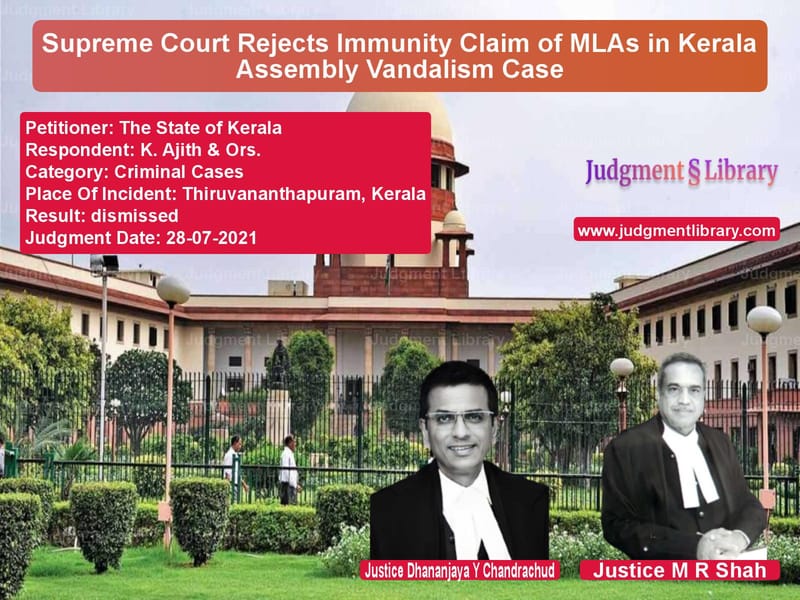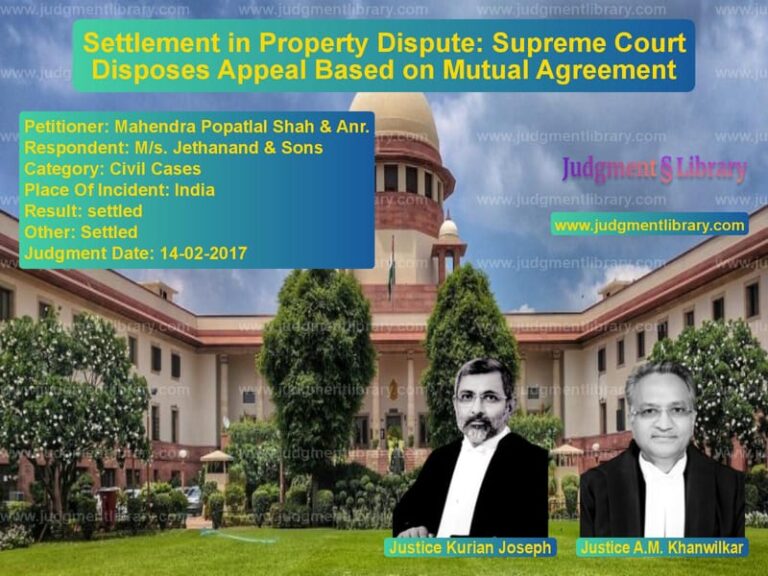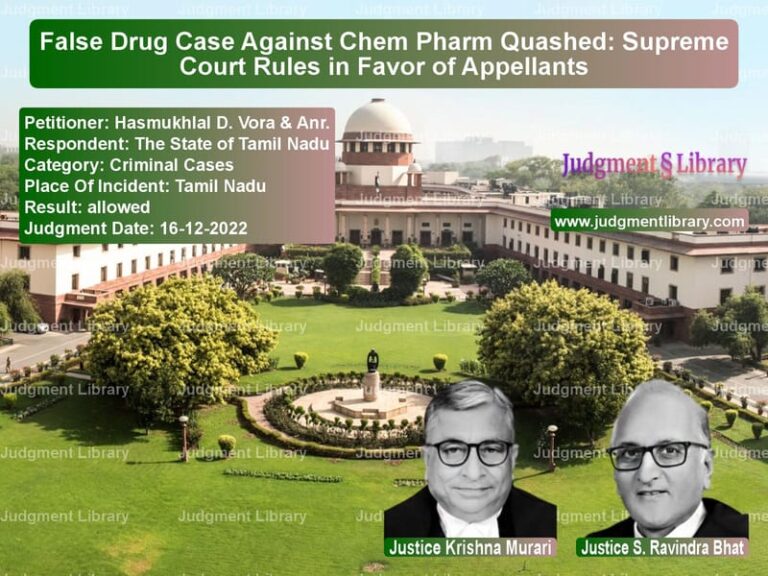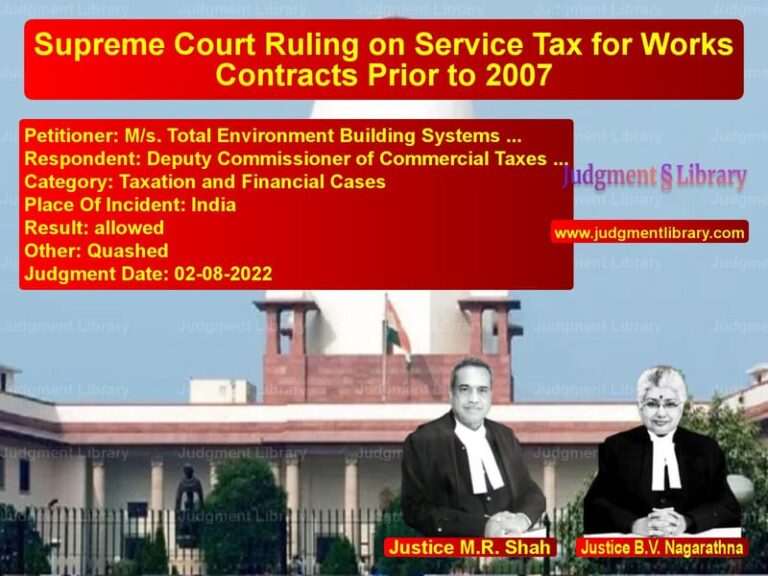Supreme Court Rejects Immunity Claim of MLAs in Kerala Assembly Vandalism Case
The case of The State of Kerala v. K. Ajith & Ors. is a significant ruling by the Supreme Court concerning legislative privileges and criminal prosecution. The judgment addresses the legal implications of MLAs committing acts of public vandalism inside the legislature and whether such actions are protected by legislative privileges under Article 194 of the Constitution of India. The Supreme Court upheld the decision of the Kerala High Court, which had denied the State’s plea to withdraw prosecution against the accused MLAs involved in the 2015 Kerala Assembly violence.
Background of the Case
On March 13, 2015, during the presentation of the state budget by the then Finance Minister, opposition MLAs disrupted the proceedings inside the Kerala Legislative Assembly. They climbed onto the Speaker’s dais, damaged furniture, broke electronic equipment, and caused destruction worth approximately Rs. 2,20,093. The Legislative Secretary lodged a complaint with the police, and a case was registered under Sections 447 (criminal trespass) and 427 (mischief causing damage) of the Indian Penal Code (IPC) and Section 3(1) of the Prevention of Damage to Public Property Act, 1984.
Upon completion of the police investigation, a final report was submitted, and cognizance was taken by the Additional Chief Judicial Magistrate (CJM), Ernakulam. However, in 2018, the Kerala government filed an application under Section 321 of the Code of Criminal Procedure (CrPC) seeking withdrawal of prosecution, arguing that the MLAs were protesting as part of their legislative duties and enjoyed privileges under Article 194(3) of the Constitution.
Arguments by the Petitioner (State of Kerala)
- The actions of the accused MLAs were part of their legislative protest and thus protected by parliamentary privileges under Article 194(3).
- According to constitutional convention, an offense committed in the Assembly requires prior approval from the Speaker before any criminal proceedings can be initiated.
- The Kerala government had approved the withdrawal of prosecution in public interest, arguing that continuation of the trial would tarnish the image of the Assembly.
- The evidence, including video footage of the incident, was obtained without the Speaker’s approval and lacked certification under Section 65B of the Indian Evidence Act, making its admissibility questionable.
Arguments by the Respondents
- The immunity under Article 194(2) applies to speech and voting in the legislature, not to acts of criminal vandalism.
- Legislative privileges do not extend to damaging public property.
- Criminal prosecution was initiated after proper investigation, and the MLAs must be held accountable under criminal law.
- Allowing withdrawal of prosecution would set a dangerous precedent where MLAs could commit crimes inside the Assembly with impunity.
Supreme Court’s Observations
The Supreme Court, while rejecting the appeal, held:
“Privileges and immunities are not gateways to claim exemptions from the general law of the land, particularly the criminal law, which applies equally to all citizens.”
The Court examined various precedents, including the UK’s parliamentary privilege laws, and noted that criminal offenses committed inside the legislature cannot be shielded under legislative privileges.
Key Takeaways from the Judgment
- No Immunity for Criminal Acts: The Court ruled that legislative privileges do not cover acts of vandalism, and MLAs cannot claim exemption from prosecution under Article 194(3).
- Judicial Oversight on Withdrawal of Prosecution: The Court emphasized that the judiciary has the power to scrutinize whether a withdrawal application is in the interest of justice or an attempt to shield accused persons.
- Public Interest Over Political Considerations: The judgment reinforced that the administration of justice takes precedence over political considerations, and elected representatives cannot misuse privileges to evade criminal liability.
- Sanction of the Speaker Not Required: The Court rejected the argument that Speaker’s sanction was necessary for prosecuting MLAs, stating that there is no constitutional or statutory provision mandating such a requirement.
- Admissibility of Video Evidence: While the Court acknowledged issues regarding certification under Section 65B of the Evidence Act, it clarified that such concerns should be addressed during trial and are not grounds for withdrawal of prosecution.
Conclusion
The Supreme Court’s verdict sets a strong precedent that elected representatives cannot engage in criminal activities inside the legislature under the guise of legislative privileges. It reinforces the principle that legislative immunity is meant to protect free speech and debate, not to shield unlawful conduct. The ruling also upholds the judiciary’s role in ensuring that withdrawal of prosecution is not misused to subvert justice.
Petitioner Name: The State of Kerala.Respondent Name: K. Ajith & Ors..Judgment By: Justice Dhananjaya Y Chandrachud, Justice M R Shah.Place Of Incident: Thiruvananthapuram, Kerala.Judgment Date: 28-07-2021.
Don’t miss out on the full details! Download the complete judgment in PDF format below and gain valuable insights instantly!
Download Judgment: the-state-of-kerala-vs-k.-ajith-&-ors.-supreme-court-of-india-judgment-dated-28-07-2021.pdf
Directly Download Judgment: Directly download this Judgment
See all petitions in Custodial Deaths and Police Misconduct
See all petitions in Fraud and Forgery
See all petitions in Bail and Anticipatory Bail
See all petitions in Judgment by Dhananjaya Y Chandrachud
See all petitions in Judgment by Mukeshkumar Rasikbhai Shah
See all petitions in dismissed
See all petitions in supreme court of India judgments July 2021
See all petitions in 2021 judgments
See all posts in Criminal Cases Category
See all allowed petitions in Criminal Cases Category
See all Dismissed petitions in Criminal Cases Category
See all partially allowed petitions in Criminal Cases Category







